The Ethics of Euthanasia: A Christian and Buddhist View on ALS Case
VerifiedAdded on 2023/04/23
|10
|2440
|437
Case Study
AI Summary
This paper analyzes the concept of euthanasia in the context of Christian and Buddhist worldviews, focusing on the case of George, who suffers from ALS. It interprets George's malady and suffering within both religious frameworks, highlighting the belief that life is given and taken by God, thus opposing euthanasia. The paper argues that despite suffering, George should not opt for euthanasia based on these worldviews. It concludes by emphasizing the moral actions dictated by Christianity and Buddhism, which value life and consider euthanasia unethical, advocating for enduring suffering and seeking spiritual growth instead of medically assisted suicide.
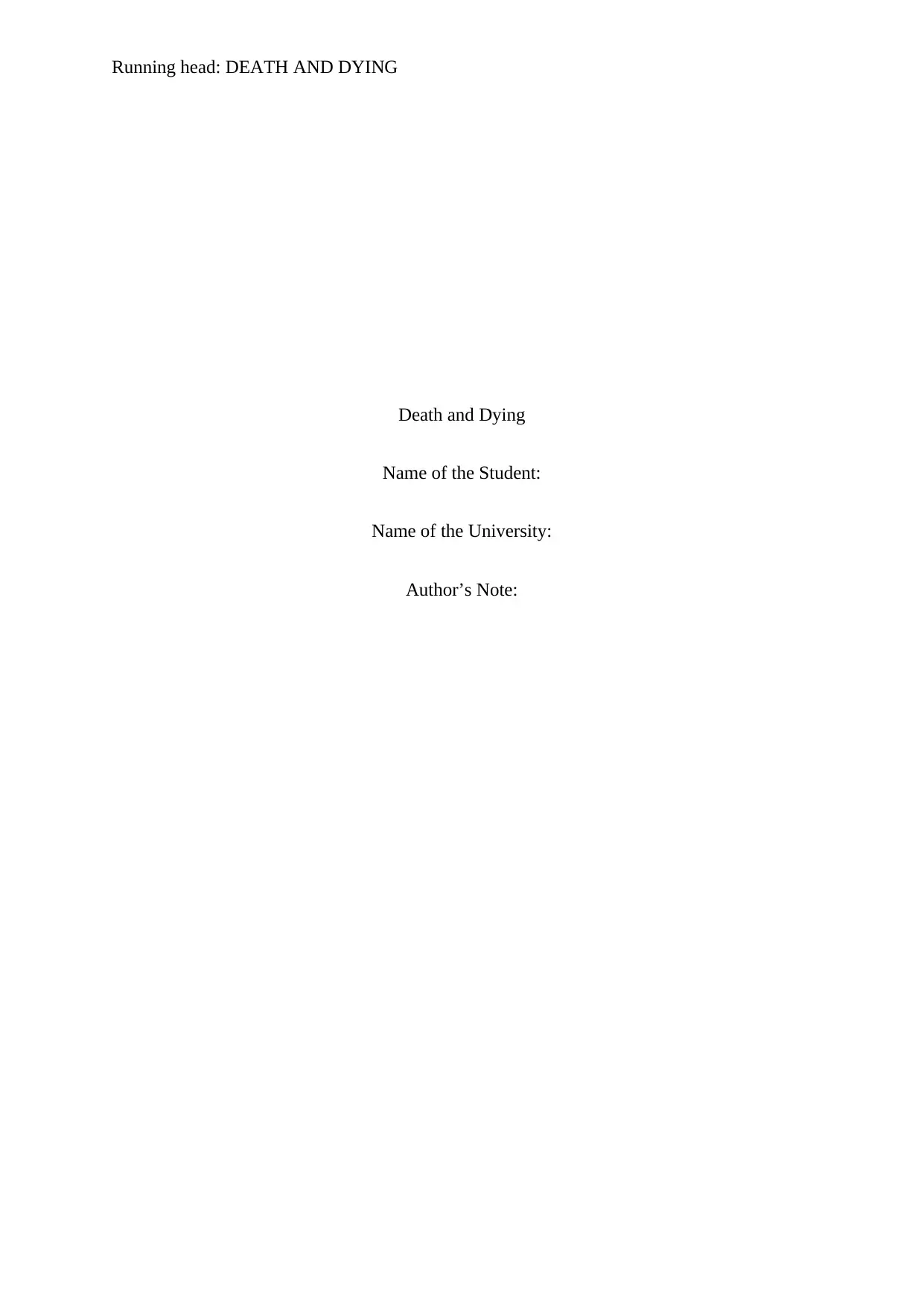
Running head: DEATH AND DYING
Death and Dying
Name of the Student:
Name of the University:
Author’s Note:
Death and Dying
Name of the Student:
Name of the University:
Author’s Note:
Paraphrase This Document
Need a fresh take? Get an instant paraphrase of this document with our AI Paraphraser
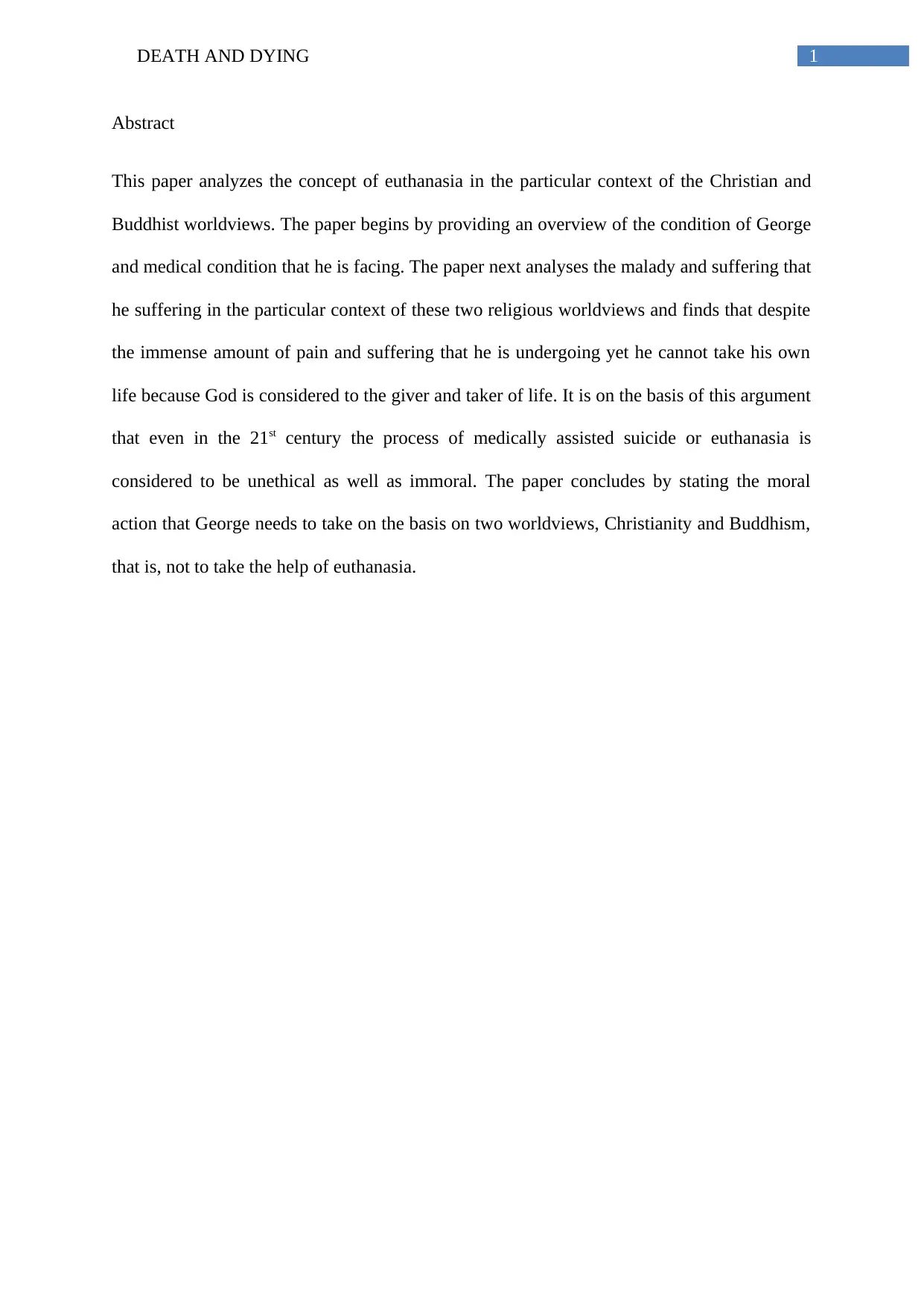
1DEATH AND DYING
Abstract
This paper analyzes the concept of euthanasia in the particular context of the Christian and
Buddhist worldviews. The paper begins by providing an overview of the condition of George
and medical condition that he is facing. The paper next analyses the malady and suffering that
he suffering in the particular context of these two religious worldviews and finds that despite
the immense amount of pain and suffering that he is undergoing yet he cannot take his own
life because God is considered to the giver and taker of life. It is on the basis of this argument
that even in the 21st century the process of medically assisted suicide or euthanasia is
considered to be unethical as well as immoral. The paper concludes by stating the moral
action that George needs to take on the basis on two worldviews, Christianity and Buddhism,
that is, not to take the help of euthanasia.
Abstract
This paper analyzes the concept of euthanasia in the particular context of the Christian and
Buddhist worldviews. The paper begins by providing an overview of the condition of George
and medical condition that he is facing. The paper next analyses the malady and suffering that
he suffering in the particular context of these two religious worldviews and finds that despite
the immense amount of pain and suffering that he is undergoing yet he cannot take his own
life because God is considered to the giver and taker of life. It is on the basis of this argument
that even in the 21st century the process of medically assisted suicide or euthanasia is
considered to be unethical as well as immoral. The paper concludes by stating the moral
action that George needs to take on the basis on two worldviews, Christianity and Buddhism,
that is, not to take the help of euthanasia.
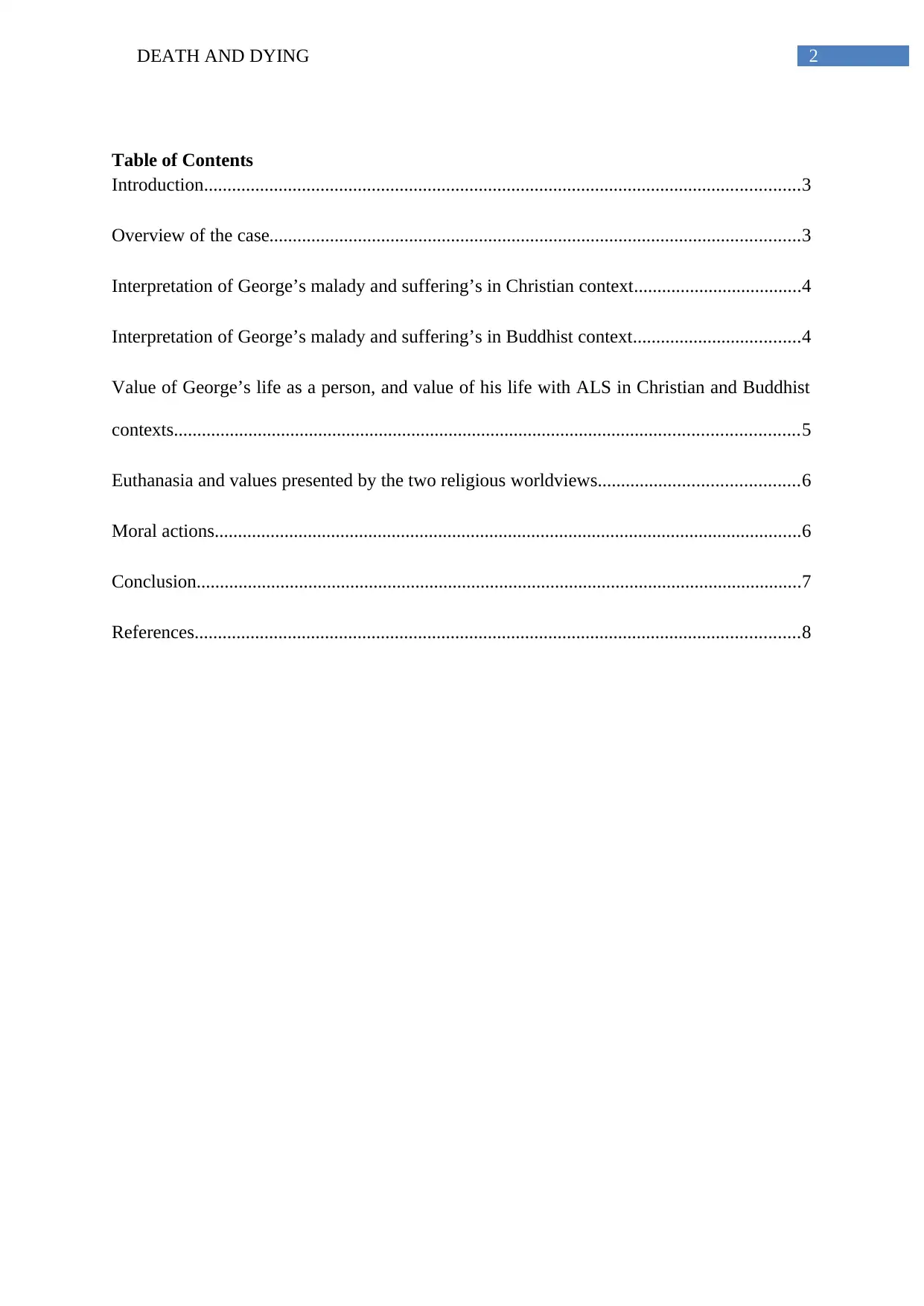
2DEATH AND DYING
Table of Contents
Introduction................................................................................................................................3
Overview of the case..................................................................................................................3
Interpretation of George’s malady and suffering’s in Christian context....................................4
Interpretation of George’s malady and suffering’s in Buddhist context....................................4
Value of George’s life as a person, and value of his life with ALS in Christian and Buddhist
contexts......................................................................................................................................5
Euthanasia and values presented by the two religious worldviews...........................................6
Moral actions..............................................................................................................................6
Conclusion..................................................................................................................................7
References..................................................................................................................................8
Table of Contents
Introduction................................................................................................................................3
Overview of the case..................................................................................................................3
Interpretation of George’s malady and suffering’s in Christian context....................................4
Interpretation of George’s malady and suffering’s in Buddhist context....................................4
Value of George’s life as a person, and value of his life with ALS in Christian and Buddhist
contexts......................................................................................................................................5
Euthanasia and values presented by the two religious worldviews...........................................6
Moral actions..............................................................................................................................6
Conclusion..................................................................................................................................7
References..................................................................................................................................8
⊘ This is a preview!⊘
Do you want full access?
Subscribe today to unlock all pages.

Trusted by 1+ million students worldwide
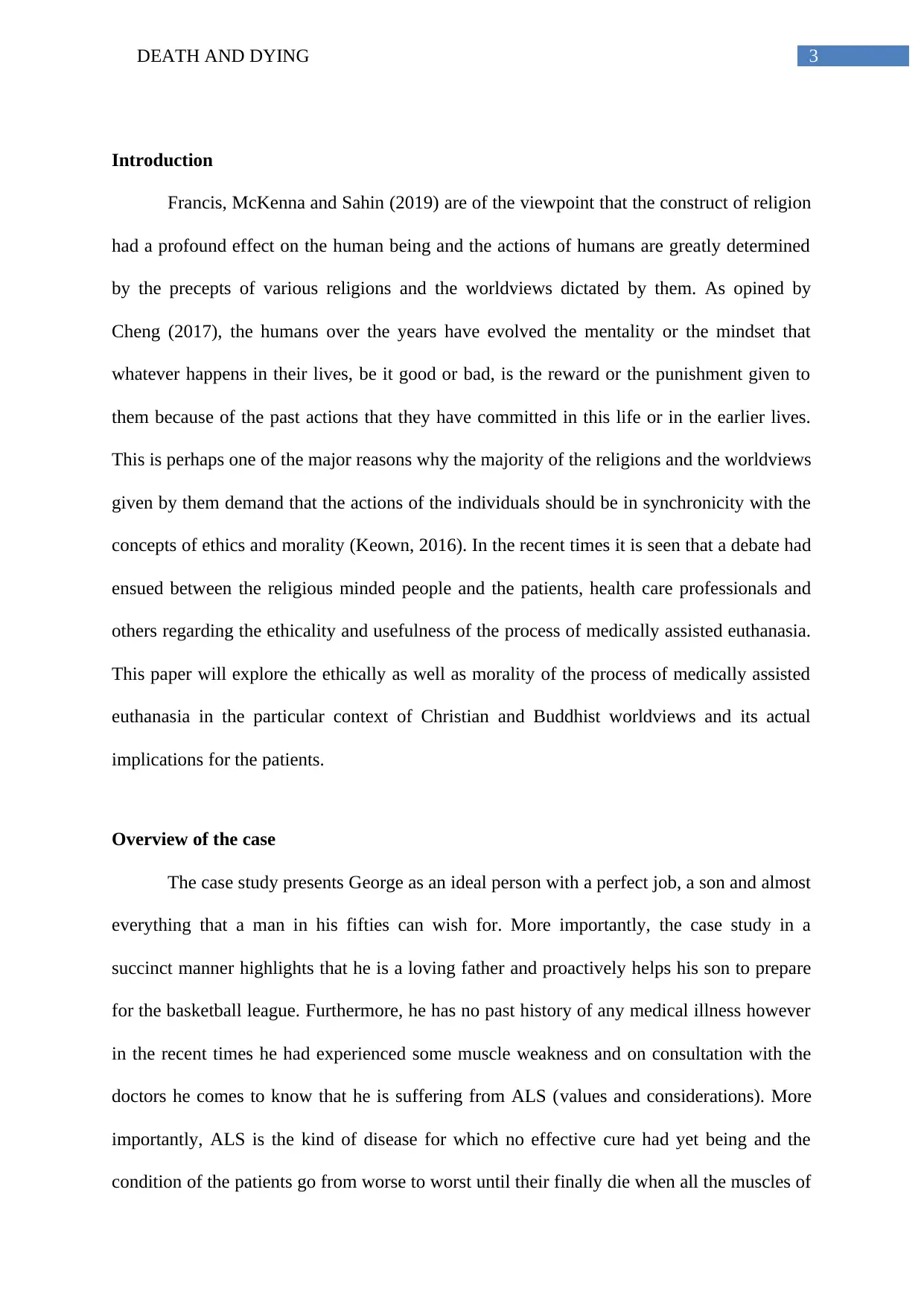
3DEATH AND DYING
Introduction
Francis, McKenna and Sahin (2019) are of the viewpoint that the construct of religion
had a profound effect on the human being and the actions of humans are greatly determined
by the precepts of various religions and the worldviews dictated by them. As opined by
Cheng (2017), the humans over the years have evolved the mentality or the mindset that
whatever happens in their lives, be it good or bad, is the reward or the punishment given to
them because of the past actions that they have committed in this life or in the earlier lives.
This is perhaps one of the major reasons why the majority of the religions and the worldviews
given by them demand that the actions of the individuals should be in synchronicity with the
concepts of ethics and morality (Keown, 2016). In the recent times it is seen that a debate had
ensued between the religious minded people and the patients, health care professionals and
others regarding the ethicality and usefulness of the process of medically assisted euthanasia.
This paper will explore the ethically as well as morality of the process of medically assisted
euthanasia in the particular context of Christian and Buddhist worldviews and its actual
implications for the patients.
Overview of the case
The case study presents George as an ideal person with a perfect job, a son and almost
everything that a man in his fifties can wish for. More importantly, the case study in a
succinct manner highlights that he is a loving father and proactively helps his son to prepare
for the basketball league. Furthermore, he has no past history of any medical illness however
in the recent times he had experienced some muscle weakness and on consultation with the
doctors he comes to know that he is suffering from ALS (values and considerations). More
importantly, ALS is the kind of disease for which no effective cure had yet being and the
condition of the patients go from worse to worst until their finally die when all the muscles of
Introduction
Francis, McKenna and Sahin (2019) are of the viewpoint that the construct of religion
had a profound effect on the human being and the actions of humans are greatly determined
by the precepts of various religions and the worldviews dictated by them. As opined by
Cheng (2017), the humans over the years have evolved the mentality or the mindset that
whatever happens in their lives, be it good or bad, is the reward or the punishment given to
them because of the past actions that they have committed in this life or in the earlier lives.
This is perhaps one of the major reasons why the majority of the religions and the worldviews
given by them demand that the actions of the individuals should be in synchronicity with the
concepts of ethics and morality (Keown, 2016). In the recent times it is seen that a debate had
ensued between the religious minded people and the patients, health care professionals and
others regarding the ethicality and usefulness of the process of medically assisted euthanasia.
This paper will explore the ethically as well as morality of the process of medically assisted
euthanasia in the particular context of Christian and Buddhist worldviews and its actual
implications for the patients.
Overview of the case
The case study presents George as an ideal person with a perfect job, a son and almost
everything that a man in his fifties can wish for. More importantly, the case study in a
succinct manner highlights that he is a loving father and proactively helps his son to prepare
for the basketball league. Furthermore, he has no past history of any medical illness however
in the recent times he had experienced some muscle weakness and on consultation with the
doctors he comes to know that he is suffering from ALS (values and considerations). More
importantly, ALS is the kind of disease for which no effective cure had yet being and the
condition of the patients go from worse to worst until their finally die when all the muscles of
Paraphrase This Document
Need a fresh take? Get an instant paraphrase of this document with our AI Paraphraser
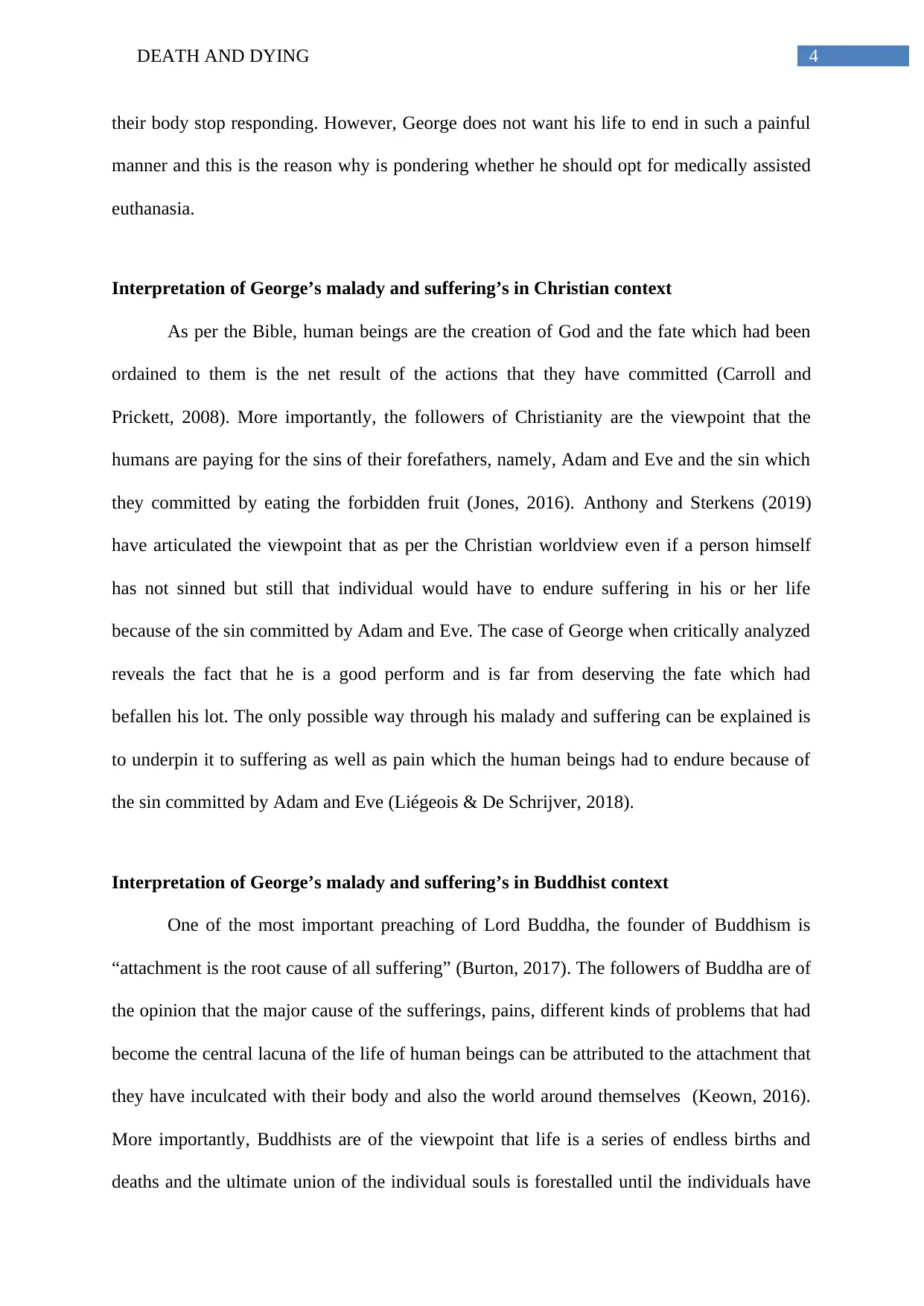
4DEATH AND DYING
their body stop responding. However, George does not want his life to end in such a painful
manner and this is the reason why is pondering whether he should opt for medically assisted
euthanasia.
Interpretation of George’s malady and suffering’s in Christian context
As per the Bible, human beings are the creation of God and the fate which had been
ordained to them is the net result of the actions that they have committed (Carroll and
Prickett, 2008). More importantly, the followers of Christianity are the viewpoint that the
humans are paying for the sins of their forefathers, namely, Adam and Eve and the sin which
they committed by eating the forbidden fruit (Jones, 2016). Anthony and Sterkens (2019)
have articulated the viewpoint that as per the Christian worldview even if a person himself
has not sinned but still that individual would have to endure suffering in his or her life
because of the sin committed by Adam and Eve. The case of George when critically analyzed
reveals the fact that he is a good perform and is far from deserving the fate which had
befallen his lot. The only possible way through his malady and suffering can be explained is
to underpin it to suffering as well as pain which the human beings had to endure because of
the sin committed by Adam and Eve (Liégeois & De Schrijver, 2018).
Interpretation of George’s malady and suffering’s in Buddhist context
One of the most important preaching of Lord Buddha, the founder of Buddhism is
“attachment is the root cause of all suffering” (Burton, 2017). The followers of Buddha are of
the opinion that the major cause of the sufferings, pains, different kinds of problems that had
become the central lacuna of the life of human beings can be attributed to the attachment that
they have inculcated with their body and also the world around themselves (Keown, 2016).
More importantly, Buddhists are of the viewpoint that life is a series of endless births and
deaths and the ultimate union of the individual souls is forestalled until the individuals have
their body stop responding. However, George does not want his life to end in such a painful
manner and this is the reason why is pondering whether he should opt for medically assisted
euthanasia.
Interpretation of George’s malady and suffering’s in Christian context
As per the Bible, human beings are the creation of God and the fate which had been
ordained to them is the net result of the actions that they have committed (Carroll and
Prickett, 2008). More importantly, the followers of Christianity are the viewpoint that the
humans are paying for the sins of their forefathers, namely, Adam and Eve and the sin which
they committed by eating the forbidden fruit (Jones, 2016). Anthony and Sterkens (2019)
have articulated the viewpoint that as per the Christian worldview even if a person himself
has not sinned but still that individual would have to endure suffering in his or her life
because of the sin committed by Adam and Eve. The case of George when critically analyzed
reveals the fact that he is a good perform and is far from deserving the fate which had
befallen his lot. The only possible way through his malady and suffering can be explained is
to underpin it to suffering as well as pain which the human beings had to endure because of
the sin committed by Adam and Eve (Liégeois & De Schrijver, 2018).
Interpretation of George’s malady and suffering’s in Buddhist context
One of the most important preaching of Lord Buddha, the founder of Buddhism is
“attachment is the root cause of all suffering” (Burton, 2017). The followers of Buddha are of
the opinion that the major cause of the sufferings, pains, different kinds of problems that had
become the central lacuna of the life of human beings can be attributed to the attachment that
they have inculcated with their body and also the world around themselves (Keown, 2016).
More importantly, Buddhists are of the viewpoint that life is a series of endless births and
deaths and the ultimate union of the individual souls is forestalled until the individuals have
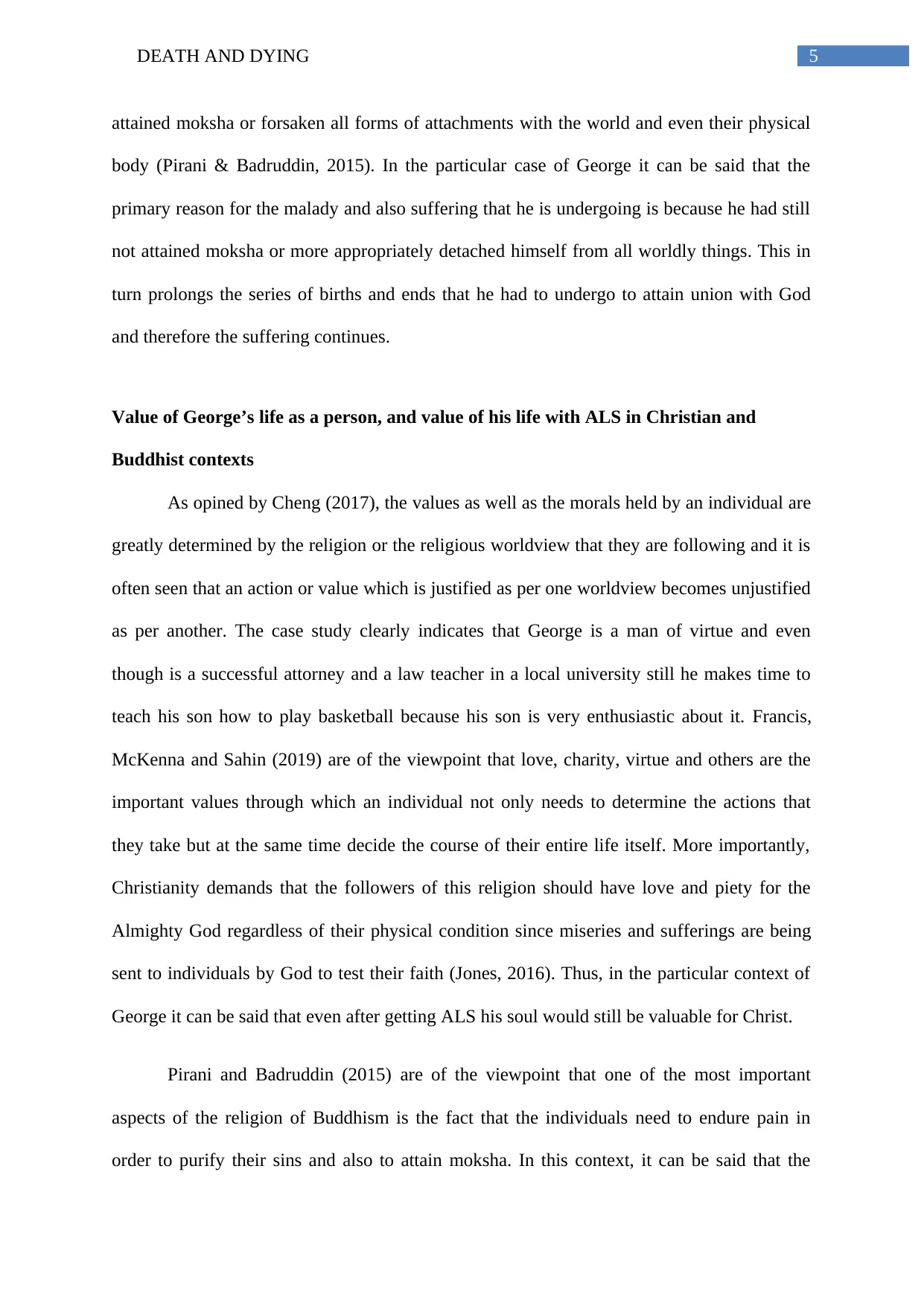
5DEATH AND DYING
attained moksha or forsaken all forms of attachments with the world and even their physical
body (Pirani & Badruddin, 2015). In the particular case of George it can be said that the
primary reason for the malady and also suffering that he is undergoing is because he had still
not attained moksha or more appropriately detached himself from all worldly things. This in
turn prolongs the series of births and ends that he had to undergo to attain union with God
and therefore the suffering continues.
Value of George’s life as a person, and value of his life with ALS in Christian and
Buddhist contexts
As opined by Cheng (2017), the values as well as the morals held by an individual are
greatly determined by the religion or the religious worldview that they are following and it is
often seen that an action or value which is justified as per one worldview becomes unjustified
as per another. The case study clearly indicates that George is a man of virtue and even
though is a successful attorney and a law teacher in a local university still he makes time to
teach his son how to play basketball because his son is very enthusiastic about it. Francis,
McKenna and Sahin (2019) are of the viewpoint that love, charity, virtue and others are the
important values through which an individual not only needs to determine the actions that
they take but at the same time decide the course of their entire life itself. More importantly,
Christianity demands that the followers of this religion should have love and piety for the
Almighty God regardless of their physical condition since miseries and sufferings are being
sent to individuals by God to test their faith (Jones, 2016). Thus, in the particular context of
George it can be said that even after getting ALS his soul would still be valuable for Christ.
Pirani and Badruddin (2015) are of the viewpoint that one of the most important
aspects of the religion of Buddhism is the fact that the individuals need to endure pain in
order to purify their sins and also to attain moksha. In this context, it can be said that the
attained moksha or forsaken all forms of attachments with the world and even their physical
body (Pirani & Badruddin, 2015). In the particular case of George it can be said that the
primary reason for the malady and also suffering that he is undergoing is because he had still
not attained moksha or more appropriately detached himself from all worldly things. This in
turn prolongs the series of births and ends that he had to undergo to attain union with God
and therefore the suffering continues.
Value of George’s life as a person, and value of his life with ALS in Christian and
Buddhist contexts
As opined by Cheng (2017), the values as well as the morals held by an individual are
greatly determined by the religion or the religious worldview that they are following and it is
often seen that an action or value which is justified as per one worldview becomes unjustified
as per another. The case study clearly indicates that George is a man of virtue and even
though is a successful attorney and a law teacher in a local university still he makes time to
teach his son how to play basketball because his son is very enthusiastic about it. Francis,
McKenna and Sahin (2019) are of the viewpoint that love, charity, virtue and others are the
important values through which an individual not only needs to determine the actions that
they take but at the same time decide the course of their entire life itself. More importantly,
Christianity demands that the followers of this religion should have love and piety for the
Almighty God regardless of their physical condition since miseries and sufferings are being
sent to individuals by God to test their faith (Jones, 2016). Thus, in the particular context of
George it can be said that even after getting ALS his soul would still be valuable for Christ.
Pirani and Badruddin (2015) are of the viewpoint that one of the most important
aspects of the religion of Buddhism is the fact that the individuals need to endure pain in
order to purify their sins and also to attain moksha. In this context, it can be said that the
⊘ This is a preview!⊘
Do you want full access?
Subscribe today to unlock all pages.

Trusted by 1+ million students worldwide
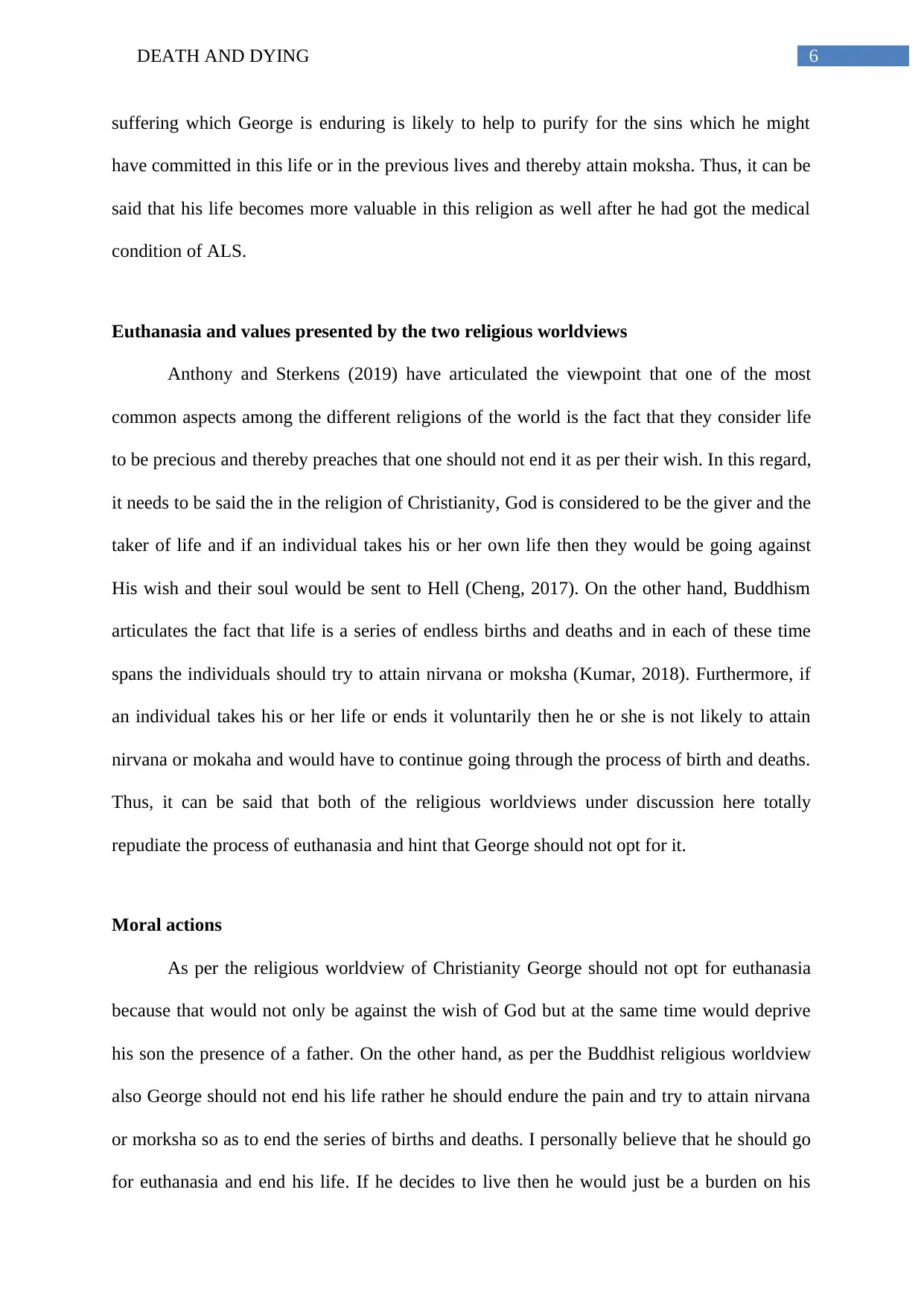
6DEATH AND DYING
suffering which George is enduring is likely to help to purify for the sins which he might
have committed in this life or in the previous lives and thereby attain moksha. Thus, it can be
said that his life becomes more valuable in this religion as well after he had got the medical
condition of ALS.
Euthanasia and values presented by the two religious worldviews
Anthony and Sterkens (2019) have articulated the viewpoint that one of the most
common aspects among the different religions of the world is the fact that they consider life
to be precious and thereby preaches that one should not end it as per their wish. In this regard,
it needs to be said the in the religion of Christianity, God is considered to be the giver and the
taker of life and if an individual takes his or her own life then they would be going against
His wish and their soul would be sent to Hell (Cheng, 2017). On the other hand, Buddhism
articulates the fact that life is a series of endless births and deaths and in each of these time
spans the individuals should try to attain nirvana or moksha (Kumar, 2018). Furthermore, if
an individual takes his or her life or ends it voluntarily then he or she is not likely to attain
nirvana or mokaha and would have to continue going through the process of birth and deaths.
Thus, it can be said that both of the religious worldviews under discussion here totally
repudiate the process of euthanasia and hint that George should not opt for it.
Moral actions
As per the religious worldview of Christianity George should not opt for euthanasia
because that would not only be against the wish of God but at the same time would deprive
his son the presence of a father. On the other hand, as per the Buddhist religious worldview
also George should not end his life rather he should endure the pain and try to attain nirvana
or morksha so as to end the series of births and deaths. I personally believe that he should go
for euthanasia and end his life. If he decides to live then he would just be a burden on his
suffering which George is enduring is likely to help to purify for the sins which he might
have committed in this life or in the previous lives and thereby attain moksha. Thus, it can be
said that his life becomes more valuable in this religion as well after he had got the medical
condition of ALS.
Euthanasia and values presented by the two religious worldviews
Anthony and Sterkens (2019) have articulated the viewpoint that one of the most
common aspects among the different religions of the world is the fact that they consider life
to be precious and thereby preaches that one should not end it as per their wish. In this regard,
it needs to be said the in the religion of Christianity, God is considered to be the giver and the
taker of life and if an individual takes his or her own life then they would be going against
His wish and their soul would be sent to Hell (Cheng, 2017). On the other hand, Buddhism
articulates the fact that life is a series of endless births and deaths and in each of these time
spans the individuals should try to attain nirvana or moksha (Kumar, 2018). Furthermore, if
an individual takes his or her life or ends it voluntarily then he or she is not likely to attain
nirvana or mokaha and would have to continue going through the process of birth and deaths.
Thus, it can be said that both of the religious worldviews under discussion here totally
repudiate the process of euthanasia and hint that George should not opt for it.
Moral actions
As per the religious worldview of Christianity George should not opt for euthanasia
because that would not only be against the wish of God but at the same time would deprive
his son the presence of a father. On the other hand, as per the Buddhist religious worldview
also George should not end his life rather he should endure the pain and try to attain nirvana
or morksha so as to end the series of births and deaths. I personally believe that he should go
for euthanasia and end his life. If he decides to live then he would just be a burden on his
Paraphrase This Document
Need a fresh take? Get an instant paraphrase of this document with our AI Paraphraser
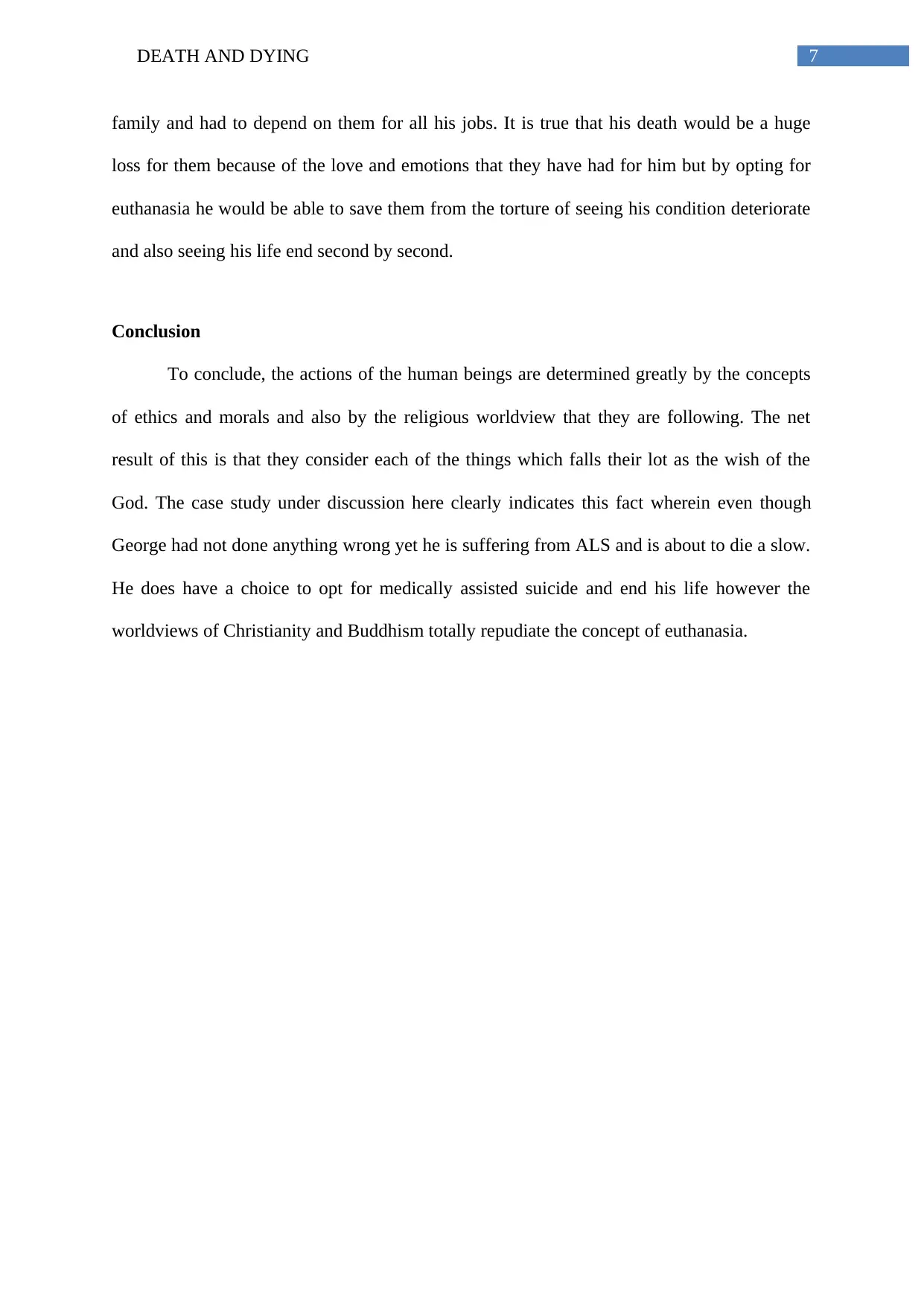
7DEATH AND DYING
family and had to depend on them for all his jobs. It is true that his death would be a huge
loss for them because of the love and emotions that they have had for him but by opting for
euthanasia he would be able to save them from the torture of seeing his condition deteriorate
and also seeing his life end second by second.
Conclusion
To conclude, the actions of the human beings are determined greatly by the concepts
of ethics and morals and also by the religious worldview that they are following. The net
result of this is that they consider each of the things which falls their lot as the wish of the
God. The case study under discussion here clearly indicates this fact wherein even though
George had not done anything wrong yet he is suffering from ALS and is about to die a slow.
He does have a choice to opt for medically assisted suicide and end his life however the
worldviews of Christianity and Buddhism totally repudiate the concept of euthanasia.
family and had to depend on them for all his jobs. It is true that his death would be a huge
loss for them because of the love and emotions that they have had for him but by opting for
euthanasia he would be able to save them from the torture of seeing his condition deteriorate
and also seeing his life end second by second.
Conclusion
To conclude, the actions of the human beings are determined greatly by the concepts
of ethics and morals and also by the religious worldview that they are following. The net
result of this is that they consider each of the things which falls their lot as the wish of the
God. The case study under discussion here clearly indicates this fact wherein even though
George had not done anything wrong yet he is suffering from ALS and is about to die a slow.
He does have a choice to opt for medically assisted suicide and end his life however the
worldviews of Christianity and Buddhism totally repudiate the concept of euthanasia.
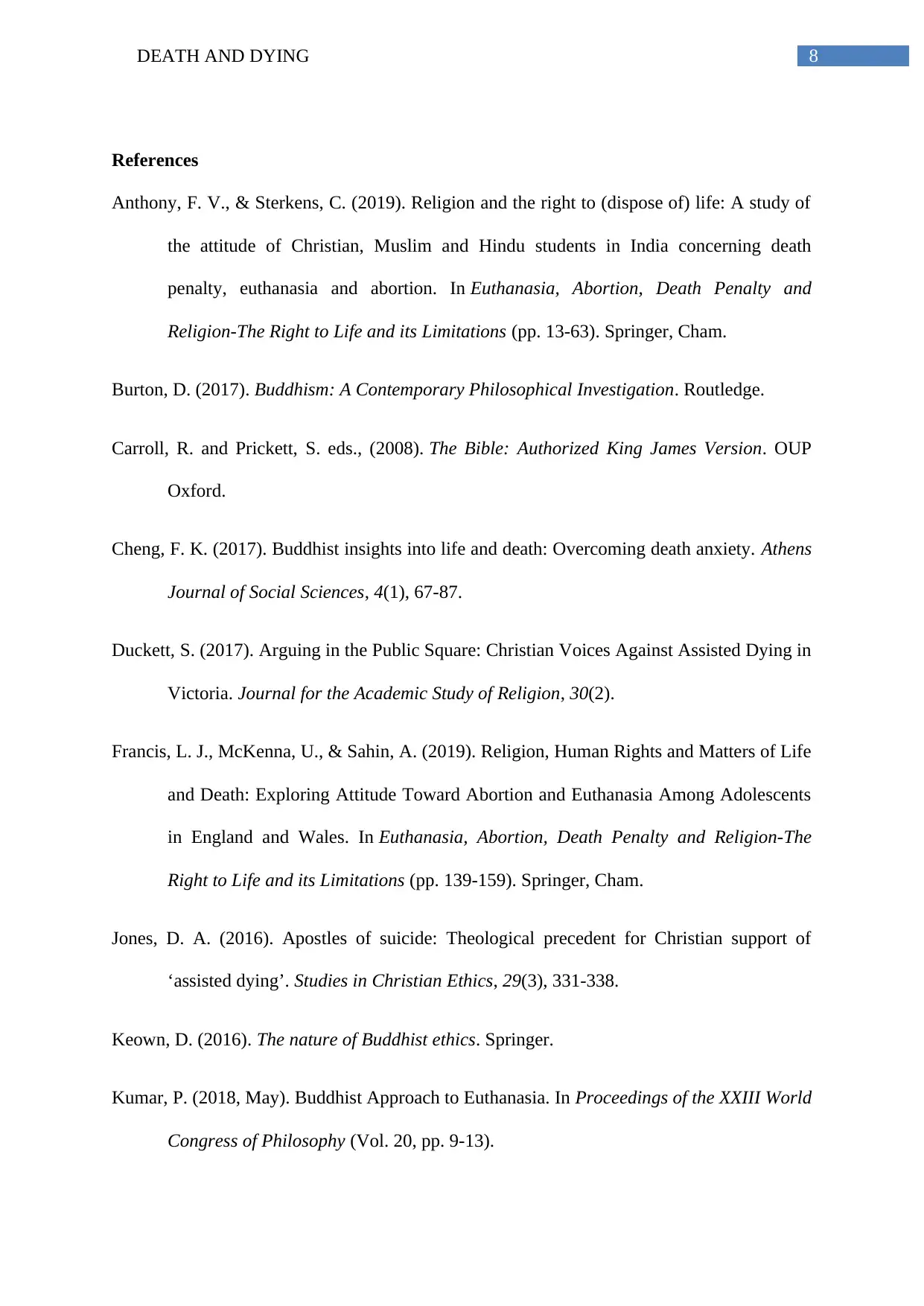
8DEATH AND DYING
References
Anthony, F. V., & Sterkens, C. (2019). Religion and the right to (dispose of) life: A study of
the attitude of Christian, Muslim and Hindu students in India concerning death
penalty, euthanasia and abortion. In Euthanasia, Abortion, Death Penalty and
Religion-The Right to Life and its Limitations (pp. 13-63). Springer, Cham.
Burton, D. (2017). Buddhism: A Contemporary Philosophical Investigation. Routledge.
Carroll, R. and Prickett, S. eds., (2008). The Bible: Authorized King James Version. OUP
Oxford.
Cheng, F. K. (2017). Buddhist insights into life and death: Overcoming death anxiety. Athens
Journal of Social Sciences, 4(1), 67-87.
Duckett, S. (2017). Arguing in the Public Square: Christian Voices Against Assisted Dying in
Victoria. Journal for the Academic Study of Religion, 30(2).
Francis, L. J., McKenna, U., & Sahin, A. (2019). Religion, Human Rights and Matters of Life
and Death: Exploring Attitude Toward Abortion and Euthanasia Among Adolescents
in England and Wales. In Euthanasia, Abortion, Death Penalty and Religion-The
Right to Life and its Limitations (pp. 139-159). Springer, Cham.
Jones, D. A. (2016). Apostles of suicide: Theological precedent for Christian support of
‘assisted dying’. Studies in Christian Ethics, 29(3), 331-338.
Keown, D. (2016). The nature of Buddhist ethics. Springer.
Kumar, P. (2018, May). Buddhist Approach to Euthanasia. In Proceedings of the XXIII World
Congress of Philosophy (Vol. 20, pp. 9-13).
References
Anthony, F. V., & Sterkens, C. (2019). Religion and the right to (dispose of) life: A study of
the attitude of Christian, Muslim and Hindu students in India concerning death
penalty, euthanasia and abortion. In Euthanasia, Abortion, Death Penalty and
Religion-The Right to Life and its Limitations (pp. 13-63). Springer, Cham.
Burton, D. (2017). Buddhism: A Contemporary Philosophical Investigation. Routledge.
Carroll, R. and Prickett, S. eds., (2008). The Bible: Authorized King James Version. OUP
Oxford.
Cheng, F. K. (2017). Buddhist insights into life and death: Overcoming death anxiety. Athens
Journal of Social Sciences, 4(1), 67-87.
Duckett, S. (2017). Arguing in the Public Square: Christian Voices Against Assisted Dying in
Victoria. Journal for the Academic Study of Religion, 30(2).
Francis, L. J., McKenna, U., & Sahin, A. (2019). Religion, Human Rights and Matters of Life
and Death: Exploring Attitude Toward Abortion and Euthanasia Among Adolescents
in England and Wales. In Euthanasia, Abortion, Death Penalty and Religion-The
Right to Life and its Limitations (pp. 139-159). Springer, Cham.
Jones, D. A. (2016). Apostles of suicide: Theological precedent for Christian support of
‘assisted dying’. Studies in Christian Ethics, 29(3), 331-338.
Keown, D. (2016). The nature of Buddhist ethics. Springer.
Kumar, P. (2018, May). Buddhist Approach to Euthanasia. In Proceedings of the XXIII World
Congress of Philosophy (Vol. 20, pp. 9-13).
⊘ This is a preview!⊘
Do you want full access?
Subscribe today to unlock all pages.

Trusted by 1+ million students worldwide
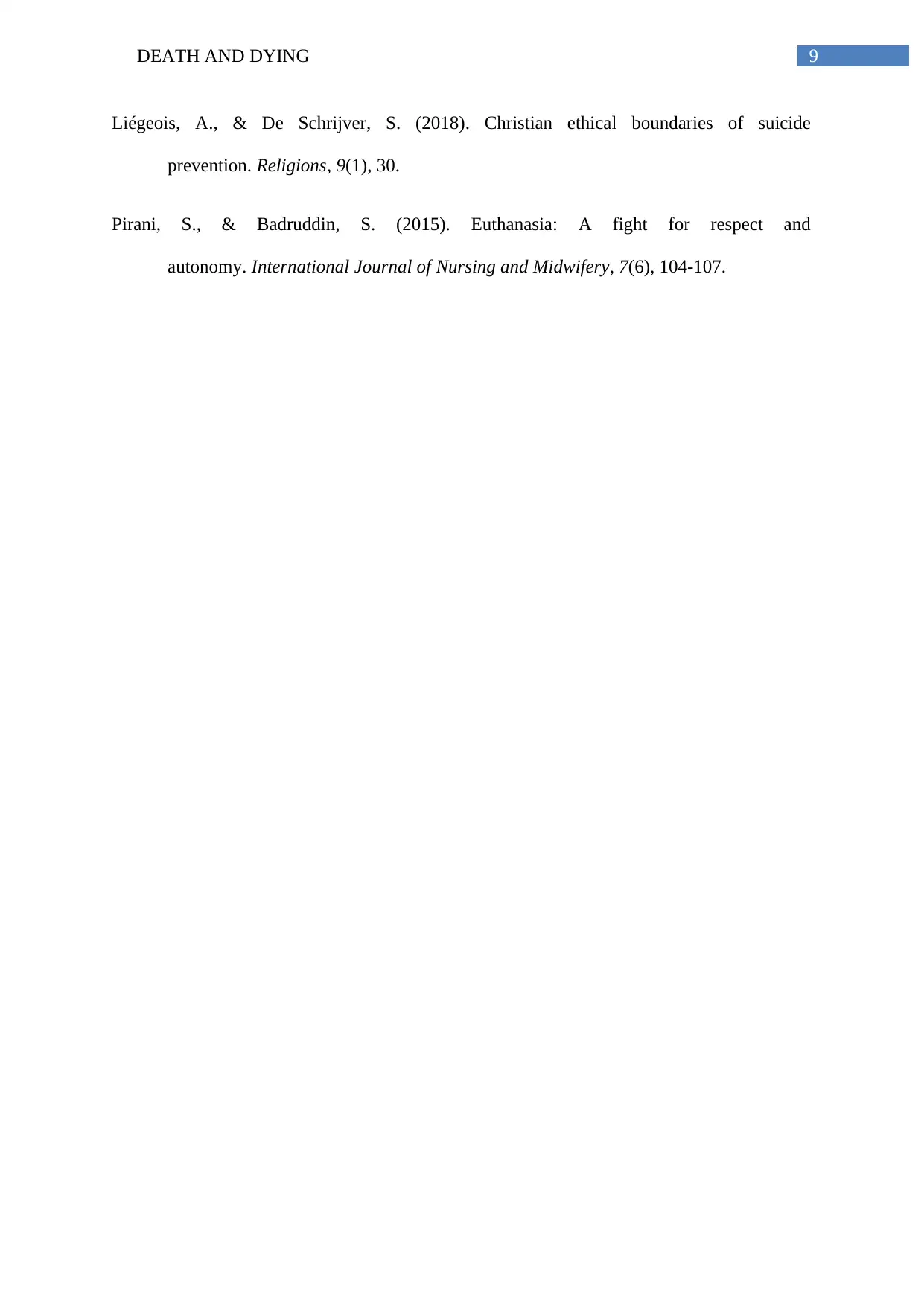
9DEATH AND DYING
Liégeois, A., & De Schrijver, S. (2018). Christian ethical boundaries of suicide
prevention. Religions, 9(1), 30.
Pirani, S., & Badruddin, S. (2015). Euthanasia: A fight for respect and
autonomy. International Journal of Nursing and Midwifery, 7(6), 104-107.
Liégeois, A., & De Schrijver, S. (2018). Christian ethical boundaries of suicide
prevention. Religions, 9(1), 30.
Pirani, S., & Badruddin, S. (2015). Euthanasia: A fight for respect and
autonomy. International Journal of Nursing and Midwifery, 7(6), 104-107.
1 out of 10
Related Documents
Your All-in-One AI-Powered Toolkit for Academic Success.
+13062052269
info@desklib.com
Available 24*7 on WhatsApp / Email
![[object Object]](/_next/static/media/star-bottom.7253800d.svg)
Unlock your academic potential
Copyright © 2020–2026 A2Z Services. All Rights Reserved. Developed and managed by ZUCOL.





